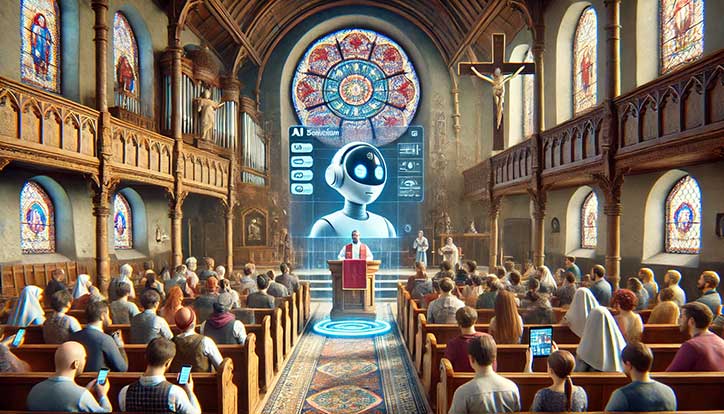
Artificial intelligence, or AI, has its place. Siri or Alexa will play your favorite music at a moment’s notice. Your doctor can use AI to help diagnose certain medical problems faster, and AI is a handy tool for your bank when fraud is suspected. However, a recent State of the Bible study shows that many Americans are uneasy about mixing faith and AI, according to the American Bible Society.
Key Findings on Faith and AI
The American Bible Society’s key findings in chapter 2, “Faith and Technology,” of the 2024 report include the following:
- Americans across the board are uneasy about mixing faith and AI. In the recently released findings, the society said 68 percent of those surveyed were skeptical about AI enhancing their spiritual practices or spiritual health. Some 58 percent said they did not believe AI could help with moral reasoning, and 57 percent doubted AI could produce a sermon on par with one written by their pastor. And 37 percent said they would take a dim view of pastors who used AI to prepare sermons.
- Gen Z adults are no more excited about AI than other age groups, despite popular opinion to the contrary. Rather, the Gen Z group is mainly concerned about how artificial intelligence will affect their jobs, especially if they lack AI skills, the American Bible Society’s research found. And 51 percent of the general public shared their concern, saying AI will result in more unemployment.
- Biblically engaged adults are more pessimistic about AI than people who aren’t interested in Scripture and people who are open to the Bible but not engaged with it. The former are doubtful technology can replicate the personal relationships they develop through their faith. Those who are open but less familiar with the Bible see AI as a starting point.
- People who watch online church services are as engaged or more engaged with the Bible than people who primarily attend church in person. “More than four in five individuals (81%) who attend church online and in person ‘about equally’ are Bible users, compared to about two-thirds of ‘primarily in-person’ attendees,” the American Bible Society said. “Moreover, continuing to provide online church services may be a tactful way to engage the Movable Middle (who are open to Bible engagement) or Non-Practicing Christians.” Learn more from the current report.
Seventy-five percent of people surveyed said they attend church in person, while about 14 percent watch services online. Some 12 percent said they worship both ways.
Eighty-two percent of Gen Z adults, 78 percent of Gen X, 71 percent of millennials and 70 percent of boomers and older prefer attending in person. Online worshippers – i.e., millennials and boomers – are more engaged in Scripture, with 80 percent being likely to read the Bible on their own.
NORC at the University of Chicago based the State of the Bible report on 2,506 online interviews with adults in the 50 states and the District of Columbia.
The research was conducted in January 2024, and the information on faith and technology is included in the second chapter of the American Bible Society’s State of the Bible 2024.
Fear & Uncertainty
“Americans are more fearful than hopeful about Artificial Intelligence, but our survey also shows a great deal of uncertainty,” said John Farquhar Plake, editor-in-chief of State of the Bible Reports and chief program officer of the American Bible Society.
The newly released chapter in the 2024 State of the Bible report focuses on online church attendance, Americans’ views about mixing faith and AI and how interacting with the Bible affects people’s optimism or pessimism about artificial intelligence. Learn more by downloading the report, which includes the latest findings.
“People just don’t know how AI will change the culture, but they’re mildly uneasy about it,” Plake noted. “And how do people of faith feel? The same way – uncertain, uneasy – but more so.”
He explained that practicing Christians and others engaged with the Bible are more uneasy about mixing faith and AI and spiritual matters than the general public is. And they are more likely to think AI use will have bad results.
Should They or Shouldn’t They?
Doubt and distrust leave Christian pastors and other leaders in a quandary. “History would tell us that ignoring technological revolutions probably isn’t the wisest choice and AI is no exception,” said Carey Nieuwhof, co-author of The Ultimate Guide to AI, Pastors and the Church. “Leaders who ignore the future have a hard time doing ministry in the future.
“But embracing AI fully without thinking through the theological, ethical, and existential questions of AI poses difficulties too,” Nieuwhof added.
As church leaders and laypersons who are uneasy about mixing faith and AI grapple with the technology, researchers are moving forward using image analysis and AI in studies of early biblical texts.
Ancient “Post-It” Notes
AI technology is helping with research on “what some describe as the ancient equivalent of Post-Its,” according to Laserfiche, an enterprise content management resource.
“…techniques developed through such handwriting analysis could end up being useful in identifying contributors to other older documents, even if it’s just through scribbled notes in the margin.”
Using image analysis, researchers were able to clarify letters written by ancient people. Researchers then used AI to analyze the handwriting of people who wrote notes on pottery.
“The letters from pairs of texts were jumbled up and the algorithm separated them based on handwriting,’” journalist Isabel Kershner explained in a New York Times story.
“Based on a statistical analysis of the results, and taking into account the content of the texts chosen for the sample, the researchers concluded that at least six different hands had written the 18 missives around the same time,” she added.
“Even soldiers in the lower ranks of the Judahite army, it appears, could read and write.” Biblical scholars have long believed that the earliest books of the Bible were written after the Israelites’ exile in Babylon, which occurred in the 6th century B.C. They reasoned there weren’t enough literate people to write the books earlier.
This finding of widespread literacy leads researchers to surmise that the Old Testament could have been written several hundred years earlier than previously thought.
More Answers or Greater Distortion?
AI has other uses when it comes to the Bible. Engineers are using AI to translate the Bible into new languages, Christianity Today reports. New apps also provide modern-day people opportunities to talk with people in the Bible including Christ.
There is also a website called bible.ai that allows people to ask questions about the Bible or seek answers from AI. The home page promises “millions of answers backed by biblical knowledge.”
As we continue mixing faith and AI, people will undoubtedly become more comfortable with it. They may even turn to technology for answers about faith issues.
What else might we expect? Will it reshape our understanding of the Bible for the better? Or will it distort our beliefs? Only time will tell.
The American Bible Society, which has studied the State of the Bible in America since 2011, will release additional chapters for the State of the Bible 2024 report between now and December. As the research continues, stay tuned for more answers.


